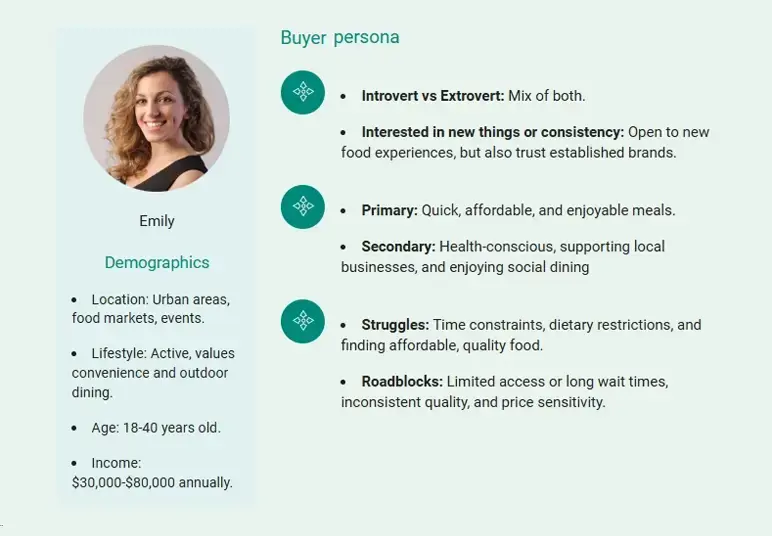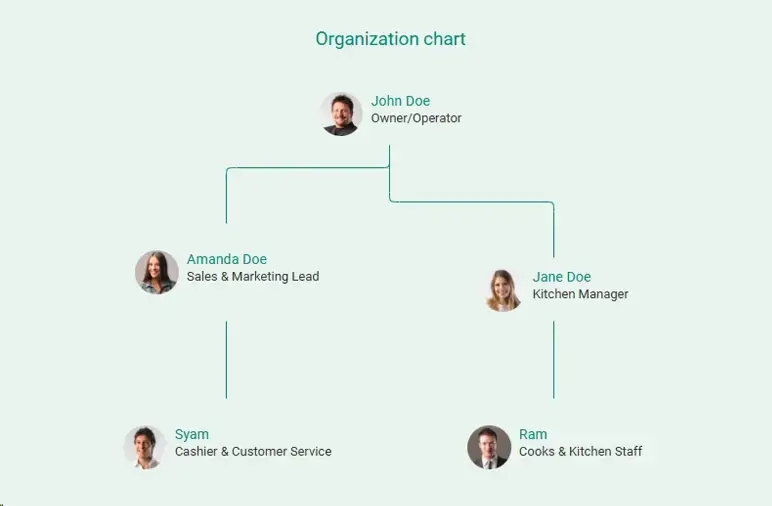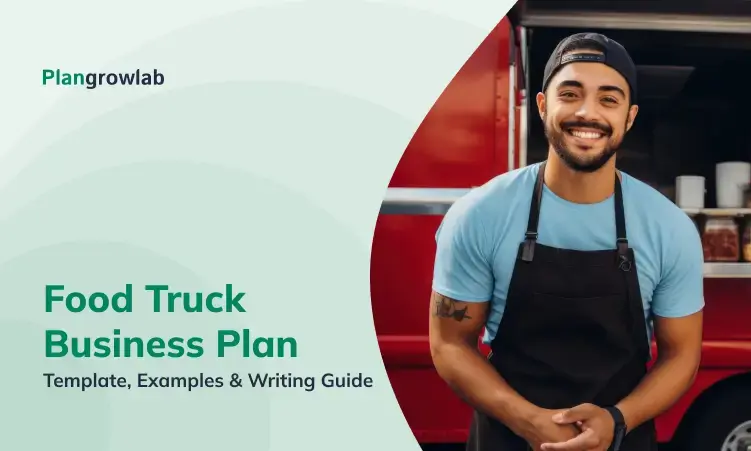These days, food trucks are more popular than ever, and it's easy to see why—delicious food, convenience, and a fun atmosphere.
If you're considering jumping into this exciting business, having a solid plan is your first step. Just ask Charles Faggart, food truck owner of “Chop it Charlie's,” how a solid plan helped him.
When we spoke, he shared about how he got organized, tackled challenges, and built a successful business by having a detailed business plan.
Inspired by his experience, I've put together this quick, practical guide. Use it as your go-to reference to prepare your own food truck business plan and start your entrepreneurial journey confidently.
What is a food truck business plan?
A food truck business plan is simply your action plan for starting and growing your food truck. It spells out what you want to achieve, the kind of food you'll serve, how you'll handle day-to-day tasks, and what you expect financially.
Having a solid plan shows you’re serious, organized, and ready to make your mark in the busy food truck scene.
The importance of a food truck business plan
Well, starting your food truck without a food truck business plan is like cooking without a recipe. You might get something done, but it'll lack direction and consistency.
Here’s why having a clear food truck business plan matters for your food truck:
- Helps set your goals and how you'll achieve them.
- Helps you secure funding from banks or investors.
- Clarifies daily operations and tasks.
- Keeps you organized and ready for unexpected challenges.
Bottom line—a food truck business plan makes your journey smoother and helps ensure your food truck
How to create an effective food truck business plan?
When writing a food truck business plan, you need to carefully think through several important sections to clearly capture your ideas on paper.
Here’s an easy-to-follow guide to make sure you cover every essential part of your food truck business:
1. Executive summary
The executive summary is one of the most important sections of your food truck business plan. It's a quick snapshot that clearly explains what your food truck is all about.
Although it's at the beginning, write this section last—after you've completed the entire plan. This makes it easy to briefly highlight the key points from each section.
Make sure your executive summary includes:
- Your food truck’s name and geographic location
- Type of food and services offered
- Your target market
- Traditional marketing techniques
- Financial expectations
Think of this section as your pitch—it should quickly grab investors' attention, clearly show your vision, and make them excited to support your food truck.
“Writing the executive summary for my food truck business was tougher than I expected because I wanted to mention everything—good food, our customers, our future goals.
But I realized it’s more important to keep it short and catchy, so people actually want to keep reading.
Saying we offer tasty food or friendly service felt too generic.
Instead, I highlighted what really sets us apart, like using locally sourced ingredients, unique menu offerings, or being known for fast service during busy events.”—Charles Faggart
2. Business description
The business overview gives readers a deeper understanding of your food truck, clearly explaining your core concept and essential details.
Start by describing your food truck idea, the unique menu items you'll offer, your legal structure (like sole proprietorship, LLC, or corporation), and the areas you'll serve, along with reasons for choosing those spots.
Then clearly state your vision, mission statement, and future goals—this helps people understand the WHY behind your food truck.
If you've been operating for a while, mention your background, key achievements, and how your business has grown.
Overall, this section helps readers see exactly what makes your food truck special.
“The tricky part was getting the tone right while writing my company overview. I didn’t want it to feel like other food trucks out there, so I included some of my own story—like how my love for cooking and seeing a gap for affordable, fresh street food inspired me to start my food truck.
Sharing that personal background made the overview feel real and helped explain why I'm truly passionate about this food truck business.”—Charles Faggart
3. Market analysis
Next, do a thorough market analysis and research for your food truck and food truck industry. This helps you deeply understand your customers, local food trends, and competitors.
As you write this section, answer questions like:
- What's the current state of the food truck market in your area? Is it growing?
- Who are your ideal customers? Families? Young professionals? College students?
- What other food trucks operates near you? Who are your main competitors?
- How will your food truck stand out? Unique menu items? Better prices? Quicker service?
- What are the most popular cuisines among food trucks in your area? Is there an underserved niche?
- What are the regulations and permit requirements in the food truck industry?
- What are the biggest challenges food truck operators face in your market (e.g., seasonality, parking restrictions, competition with brick-and-mortar restaurants)?
- How does the weather impact food truck sales in your location, and how will you plan for it?
- What are common complaints by your target customers about food trucks, and how will you address them?
- Are there partnership opportunities with local businesses, breweries, or local event organizers to boost sales?
Also, creating a buyer persona helps you clearly see your customers' tastes and habits, so you can better match your menu and food truck marketing to them.
Here's an example of a food truck’s buyer persona:

A detailed, well-researched market analysis proves to investors you know exactly where your food truck fits into the larger market. It shows you're serious and prepared.
“I knew food trucks were becoming popular, but I had to get specific about who my customers would actually be.
I spent time researching local trends—like nearby offices, campuses, and busy event venues—to understand where people needed quick, tasty meal options.
I also chatted with potential customers and local business owners to hear what they thought was missing. Many said they wanted more diverse food choices that were both affordable and convenient.
These conversations gave me a clear idea of how my food truck could uniquely serve the community and fill that need.”—Charles Faggart
4. Sample menu
This is the service section where you clearly describe what your food truck actually offers to customers.
Start by listing your main menu items and services—like specialty dishes, beverages, daily specials, or catering services.
Then, briefly explain how these delicious food items and other offerings benefit your customers. Also, share a basic outline of your pricing strategies, whether it's combo deals, single-item prices, or catering packages. You don't have to give exact numbers, just enough for readers to understand.
Next, mention any extra services or features that add value—like locally sourced ingredients, quick ordering via mobile apps, or special dietary options.
Highlight unique touches that make your truck special, like signature recipes, speedy service, or availability for big events. Keeping this part clear and focused on customer needs will make your food truck stand out.
“Figuring out how to clearly explain my menu items without making it too long was a bit tricky.
I decided to organize things into clear groups—like signature sandwiches, daily specials, and catering options. That made it easy to follow, but I knew the details would make a difference.
For instance, I emphasized special touches like offering vegetarian options and using fresh, local favorite ingredients.
Including these specifics helped my food truck feel real and highlighted exactly how my services matched what customers were looking for.” —Charles Faggart
5. Sales and marketing plan
Your food truck marketing plan clearly explains how you'll attract customers, keep them coming back, and grow your food truck business.
You need strategies that effectively bring people in, keep regular customers happy, and boost your revenue. Here are some food truck marketing ideas you want to include for a competitive advantage:
- Social media platforms (Instagram, Facebook, TikTok) showcasing mouth-watering dishes and special offers.
- Local promotions, like community events, farmers’ markets, or partnering with local businesses.
- Customer loyalty rewards or discounts for repeat customers.
- Special incentives, like discounted combos for first-time visitors.
- Referral bonuses for customers who spread the word.
A clear, realistic food truck marketing plan shows potential investors you know how to connect with your customers and make a profitable business.
“It was tricky figuring out how to promote my food truck without overspending, so I started simple.
I created an Instagram page and encouraged happy customers to tag us and leave reviews. This boosted our visibility and helped build trust locally.
I also shared behind-the-scenes clips from the kitchen and customer photos enjoying our great food, giving people a real feel for our vibe and menu.” —Charles Faggart
6. Management team
In the management team section of your food truck business plan, introduce yourself first. Briefly share your background, cooking experience, and any skills or training relevant to running a successful food truck.
If you have other team members—like a chef, marketing manager, or assistants—mention their roles and what experience or skills they bring to your business.
It also helps to include a simple organization chart, clearly showing who does what and how your team is structured. This gives potential investors or partners confidence that you’ve got the right people to help your food truck succeed.

If your food truck business has advisors or mentors, mention them here too. Briefly highlight who they are, their expertise, and how they support your food truck.
“Since I'm running the food truck alone at the moment, I was worried people might think I didn't have enough support.
But then I realized I could use the management team section to highlight my strengths, like my culinary training, years in the restaurant business, and passion for customer service.
Sharing these details reassured readers—and potential investors—that I wasn't just figuring it out as I went along. It clearly showed I have the skills and dedication to run my food truck smoothly, even on my own.”—Charles Faggart
7. Operations plan
The operations plan explains clearly how your food truck business runs day-to-day. Think of it as a behind-the-scenes view of what keeps your truck organized and operating smoothly.
Here’s what you should include in your food truck’s operations plan:
- Daily tasks (food prep, cooking, taking orders, cleanup)
- Managing inventory and supplies
- Staff scheduling and responsibilities
- Food safety standards and practices
- Truck maintenance and location scheduling
Keep this section practical and straightforward, helping readers clearly see how you'll manage operations and maintain efficiency. This shows you're organized, prepared, and ready to handle the everyday details of your food truck business.
“One big challenge was figuring out how to stay flexible while still keeping things efficient.
With food trucks, each day can be unpredictable—sometimes you're booked ahead for corporate events, other times you're busy with unexpected crowds or last-minute requests.
To handle this, I set up a simple system for tracking inventory, planning prep work, and scheduling staff.
This approach helped me stay organized, avoid wasting food, and serve more customers without feeling overwhelmed.”—Charles Faggart
8. Financial plan
Now, let's dive into the financial details of your food truck!
Here’s where you clearly outline your startup costs, expected earnings, and how you'll handle expenses.
A realistic and detailed financial plan shows you—and potential investors—whether your food truck business is financially healthy and sustainable. It’s smart to include financial projections covering at least your first 3-5 years.
Include these key financial statements in your food truck business plan:
- Profit and loss statement
- Cash flow statement
- Balance sheets
- Break-even point
Along with these numbers, clearly state how much funding you're requesting and exactly how you'll use that money. Also, be upfront about any financial risks or challenges you anticipate—and your strategies for handling them.
“I’ll admit, the financial section felt overwhelming at first. Numbers aren’t my strong suit, but they're crucial for success.
Early on, I underestimated certain expenses. I'd planned for basics like ingredients, fuel, and permits but overlooked costs like kitchen equipment maintenance and emergency repairs.
Learning from that, I made sure to detail everything clearly in my financial projections—because those hidden costs can add up fast. Getting specific helped me feel confident and showed I knew exactly what it would take to keep the business profitable.”——Charles Faggart
Download a free food truck business plan sample
Ready to start your food truck business but need some help writing the plan? No worries—I’ve got you covered.
Download our free food truck business plan template PDF to kickstart the process.
This easy-to-use, investor-friendly template has helped many entrepreneurs launch their food trucks successfully. Packed with practical tips, insights, and real-world examples, it guides you step-by-step through every key detail.
Simply download the template, fill it out, and customize it to match your food truck vision.
Conclusion
Let’s wrap up! We’ve covered all the key sections to create a strong food truck business plan.
Still need a little extra help? No worries—our business planning consultants are here for you.
From drafting your plan to reviewing financial projections, we'll guide you clearly through each step. Our professionals make sure your food truck business plan is ready to impress investors and set you up for success.
Reach out today, and let's get your food truck rolling!
Frequently Asked Questions
What could be the primary sources of revenue and expenses for a food truck business?
Your main income and costs usually include:
- Revenue from food sales, catering events, and special occasions
- Expenses such as unique cuisine ingredients, fuel, vehicle maintenance or rent, permits, licenses, employee wages, and food truck marketing materials
How do I secure funding for my food truck business plan?
Securing funding can be done through several ways:
- Approaching banks loans
- Seeking investments from private investors
- Using crowdfunding platforms to raise money
- Applying for small business grants or loans
Do I need a formal food truck business plan to launch a small business?
You don't legally need one, but having a formal plan greatly improves your chances of success:
- It clearly outlines your goals and overall strategy.
- Makes it easier to secure funding from investors or lenders.
- Keeps you organized and focused on daily tasks.
- Gives you and others confidence in your long-term success.
How long should a food truck business plan be?
Your food truck business plan doesn't have to be extremely lengthy—keep it clear and focused:
- Typically, 15–25 pages is enough
- Covers key sections without being overly detailed
- Short enough to keep readers engaged yet comprehensive enough to be effective
Where can I get a free food truck business plan template PDF?
Getting a ready-made template saves time:
- Download a free PDF template from sites like PlanGrowLab
- Includes helpful examples and real-life insights
- Easy to customize according to your specific needs

